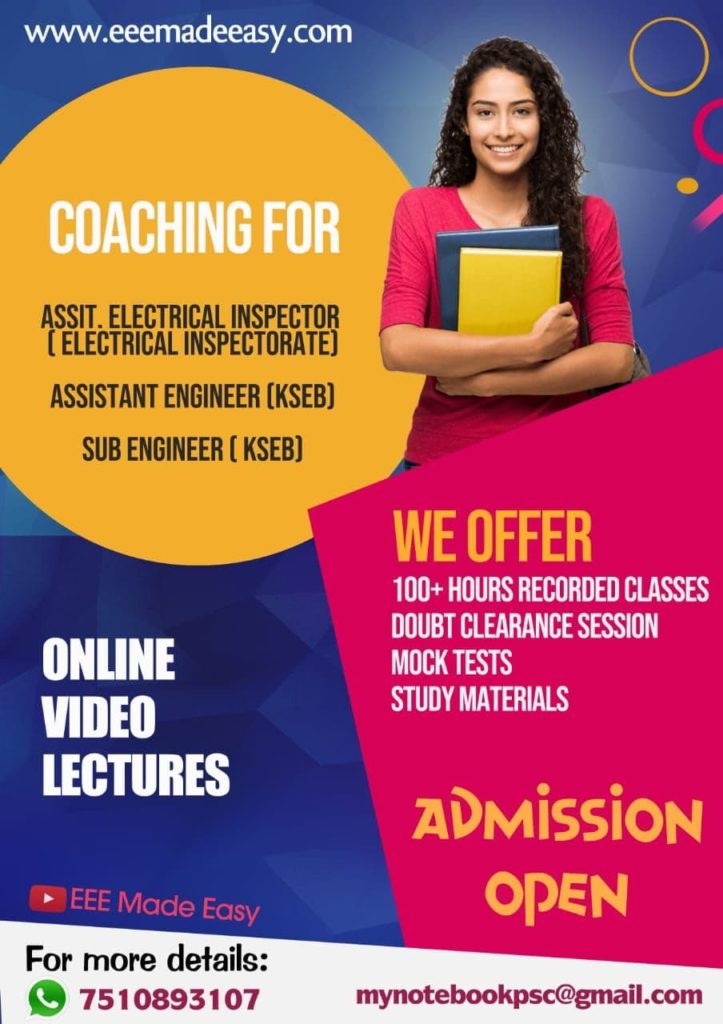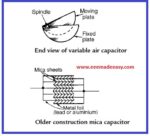Sub Engineer KSEB Detailed Syllabus Download PDF
KSEB sub Engineer Electrical Exam will be conducted on 10 February 2023. In this post, you can read and download KSEB Sub Engineer Exam 2023 Syllabus download.
KSEB Sub Engineer Interview Questions
Download KSEB Sub Engineer Exam 2023 Syllabus
KSEB Sub Engineer Exam 2023 Syllabus
DETAILED SYLLABUS FOR THE POST OF SUB ENGINEER (ELECTRICAL) IN KERALA STATE ELECTRICITY BOARD LIMITED (Cat.No.: 553/2021) (Total Marks- 100)
MODULE -I ( 16 Marks )
1 Fundamental Laws and Electric Circuits- Ohm’s Law, Kirchoff‘s laws, Laws of
resistance, effect of temperature on resistance-problems.
Series and Parallel circuits-Effective resistance, determine the unknown value of
current and voltage in any branch.
2 Network theorems in dc Circuits-Superposition theorem, Thevenin’s theorem,
Norton’s theorem, Reciprocity theorem, Maximum power transfer theorem-problems
3 Concepts of power and Energy– single phase and three phase powers-problems,
energy consumed for a specific duration-problems.
4 Electrostatics and Electromagnetism- Laws of electrostatics, absolute and relative
permittivity, electric field, field strength, flux density, potential at a point. Charging
and discharging of capacitors, various combinations of capacitors, energy stored in a
capacitor-problems.
Coulomb’s Laws of electromagnetism, magnetic permeability, flux, flux density,
reluctance, mmf, B-H curve, Faraday’s laws of electromagnetic induction, statically
and dynamically induced emf, energy stored in an inductor, lifting power of an
electromagnet.-problems.
5 Electrical Measuring instruments–Classification of measuring instruments, various
torques, MI and MC types ammeters and voltmeters, measurement of power, energy,
resistance, inductance and capacitance, frequency, power factor, time period, phase
and phase angle.
6 Electrical engineering materials-Conducting materials, semiconductors, magnetic
materials and insulators.
MODULE-II (20 Marks)
1 Power-Definition-Equations for three phase and single phase .Power triangle-
Power factor-Cause and effect of low power factor- methods for pf improvement-
Equipment for pf correction-problems.
Energy- Definition – Units. Power generating stations-Classification-Equipment-Selection of site. Tariff– Types- Determination of Energy cost based on tariff. Base load-Peak load-Connected load-
Maximum demand-Demand factor- load factor- Diversity factor- load curve.
Interconnection of power systems- problems.
2 Transmission lines–Classification-Types of conductors and insulators. Causes of
insulator failure. Supporting structures-Sag- string efficiency- Problems.
Transmission line parameters-transposition-line losses-efficiency-regulation-
Problems. Ferranti effect-corona-skin effect. Feeder-distributor-service mains.
Distribution-Overhead (OH) and Underground (UG) distribution system- UG cable
laying methods.
3 Relays and Circuit breakers-Classification- construction- operating principlecharacteristics-
protection schemes. Lightning arrestors-Earth connection- Earth
resistance values for houses, small substations, large sub stations and generating
stations.
4 Laws of Electrolysis– applications- Electric welding-Types. Electric heating–
Electric Traction-speed time curves-traction effort- specific energy consumption-
Energy output at drive axle-Problems. Electric braking.
5 Conventional and Non-conventional energy sources. Classification-Solar energy
production-collection-storage-applications. Wind energy-production, collection and
storage systems.
MODULE –III (16 Marks)
1 Measuring instruments – Classification-working principle-Torques-Errors- Range
extension-Voltage-current-single phase and three phase power- energy measurements
and measuring instruments- Megger-Insulation tester. Measurement of resistance-
Wheatstone’s bridge-Volt Ampere method- Potentiometer method. Cable fault
detection using Murray and Varley loop tests.
Measurements of inductance and capacitance- Maxwell’s bridge, Anderson bridge-Schering Bridge. Problems.
Cathode ray oscilloscope-Synchro scope-Frequency meter– TOD meter-Digital
meters for voltage, current, frequency measurements.
Sensors and Transducers used for electrical measurements.
2 Types of wires –cables-switch-fuse. Ratings of wiring accessories-selection of wiring
accessories-specifications- applications.
Domestic and industrial wiring schemes-IE rules-IS codes-Circuits and sub circuits.
Laws of illumination-lighting schemes illumination levels- space to height ratio-depreciating factor- Utilization factor, lighting calculation for buildings and open spaces- problems. Types of lamps used
for illumination.
MODULE –IV (16 Marks)
1 DC generators and Motors – Construction-Working principle-Classification-types of
windings- split ring and slip ring- DC generator characteristics-OCC and load
-armature reaction-commutation-equalizer-Critical speed-Critical field resistance-
Internal and external characteristics-Parallel operation and load sharing-application-
EMF equation-problems. DC motor –types-characteristics-Voltage equation- speedtorque-
problems. Starters for DC motors-Methods of speed control-determination of
losses and efficiency. Design aspects of DC machines. Problems.
2 Transformer-types-construction-principle of operation-EMF equation-turns ratiolosses-
efficiency-Problems.
READ : KSEB sub Engineer Civil Syllabus
Instrument transformers-Autotransformer-problems.
Induction motors-single phase and threephase- types-construction-principle of
operation-Torque-speed-losses-power stages- slip-problems. Starters for single phase
and three phase induction motors-speed control methods.
3 Synchronous Generator and motor – Construction-principle of operation-
Characteristics-parallel operation-Load sharing between generators. Synchronous
motor –applications-Excitation- problems.
4 FHP motors-Classification- Construction-working principle-shaded pole motoruniversal
motor-stepper motor-Reluctance motor.
MODULE – V ( 16 Marks)
Active and passive components– Formation of semiconductors and PN junction-
Diodes and Transistors-Types-Characteristics.Rectifiers-Classification-Peak Inverse
voltage-Ripple factor-Regulation-Efficiency-problems. Types of filters-advantages.
-Zener diode –IC Voltage regulators. Wave shaping Circuits-Clipper-Clamber –
biased and unbiased. Amplifiers-Classification-Coupling methods-Frequency
response- feedback-applications. Oscillators- classification- sinusoidal-Condition for
sustained oscillation-principle of operation-Hartley, Colpitts, RC Phase shift, Crystal
oscillators. Non-sinusoidal-Multi vibrators-Astable-Mono stable-Bi stable. Schmitt
trigger-LTP, UTP. Operational amplifiers-Applications-Characteristics-ideal op amp-
Configuration-ICs.
Number system-Binary-Octal-Hexadecimal-1’s and 2.s complement-logic gates-truth
table. K-map, Combinational and sequential logic circuits-classification- working application.
Flip Flop-Counters –Shift registers.
MODULE – VI ( 16 Marks)
1 Power electronic devices-UJT, BJT, POWER DIODE, MOSFET, IGBT,DIAC,
TRIAC, SCR, Construction –operation-characteristics-Terms related to these
devices, SCR-two transistor model- Triggering-commutation techniques.
Power electronic circuits- Controlled rectifiers, Chopper, Inverters, Cycloconvertersworking,
applications and classifications-Electric drives-4 quadrant operation-
Selection of drive motors. Power supplies– SMPS, UPS, Servo stabilizers, Buck-
Boost Regulators.
2 Microprocessor 8085 –features-functions-instructions-addressing modes-functional
blocks.
Microcontroller 8051– features-functions-instructions–addressing modes functional
blocks. Features of AVR-PIC. Microcontrollers and Programmable logic
controller.
3 Industrial automation – Need of automation, requirements. Control System- control
system components, error detectors, servomotors, synchro. Control actions-ON
OFF,P,I,PI,PD and PID. Distributed control systems.
**************
NOTE: – It may be noted that apart from the topics detailed above, questions from other
topics prescribed for the educational qualification of the post may also appear in the
question paper. There is no undertaking that all the topics above may be covered in the
question paper.
DOWNLOAD PDF
KSEB Sub Engineer Electrical Crash Course
Sub Engineer KSEB Course offered from EEE Made Easy.
- As per the following detailed syllabus
- Recorded classes
- Doubt clearance and Discussion group
- topic wise practice and doubt clearance
- Chapter-wise mock tests
- Previous year Question paper discussion
For Admission, please contact on 7510893107. Whatsapp message for course structure and fee details
SUB ENGINEER (ELECTRICAL) KERALA STATE ELECTRICITY BOARD Syllabus
KSEB sub-engineer electrical study material
sub engineer electrical study material check HERE
kseb sub engineer electrical syllabus, kseb sub engineer syllabus 2022 pdf download,553/2021 sub engineer syllabus, kerala psc sub engineer syllabus 2022, kerala psc sub engineer syllabus ,sub engineer electrical syllabus 2022, psc sub engineer syllabus, kpsc sub engineer syllabus
sub engineer psc syllabus, kerala psc syllabus for sub engineer electrical, sub engineer kseb syllabus 2022, kseb sub engineer electrical syllabus, psc sub engineer electrical syllabus ,syllabus of kseb sub engineer, sub engineer kseb syllabus, kseb sub engineer syllabus 2022 pdf,kseb sub engineer exam syllabus 2022, kerala psc kseb sub engineer civil syllabus, kseb sub engineer syllabus pdf download,kseb sub engineer syllabus,kseb sub engineer syllabus 2022,sub engineer kseb syllabus 2022
OLD syllabus of KSEB Sub Engineer Electrical
Sub Engineer KSEB Detailed Syllabus [Older Version]
PART I: ELECTRICAL ENGINEERING
BASIC ELECTRICAL ENGINEERING
Electrical Circuits and Networks:
Electrostatics Magnetism
AC Fundamentals
DESIGN ESTIMATING AND COSTING
Domestic Wiring
UTILIZATION OF ELECTRICAL POWER
Electrical Heating
Electrical Drives in Industry
DC MACHINES
GENERATION, TRANSMISSION, AND DISTRIBUTION, SWITCHGEAR AND PROTECTION
AC MACHINE, TRANSFORMERS, ELECTRICAL MEASUREMENT, AND MEASURING INSTRUMENT
PART II: ELECTRONICS ENGINEERING
BASIC ELECTRONICS, ELECTRONIC DEVICES, AND CIRCUITS & DIGITAL ELECTRONICS
Semiconductor materials, devices, and circuits :
Digital electronics and Op-Amps :
Communication systems.
POWER ELECTRONICS
Sub Engineer KSEB Detailed Syllabus Download PDF
Best Books for KSEB sub Engineer Electrical
- Environment MCQ for RRB JE CBT 2|Objective Questions Environment for Competitive Exams
- RRB JE CBT 2 Computer Awareness Book Arihant|Objective Computer Awareness Book 2025
- RRB JE CBT 2 Exam Date 2025 Postponed|RRB JE CBT 2 Exam Date
- [PDF]RRB JE Result 03/2024 Cut off, Selected no of candidates for all regions
- [PDF]Final Answer Key Junior Instructor Mechanic Agricultural Machinery|643/2023 Solved Question paper
- Acoustics MCQs|Industries Extension officer|IEO 2025
- LASER MCQs| Industries Extension officer|IEO 2025
- Practical Types of Capacitors
- [PDF] Syllabus JUNIOR INSTRUCTOR MECHANIC AGRICULTURAL MACHINERY|643/2023 Syllabus Kerala PSC
- [PDF] Syllabus JUNIOR INSTRUCTOR WOOD WORK TECHNICIAN|674/2023 Syllabus Kerala PSC
- [PDF] Syllabus JUNIOR INSTRUCTOR MECHANIC CONSUMER ELECTRONIC APPLIANCES|670/2023 Syllabus Kerala PSC
- [PDF] Junior Instructor Hospital Housekeeping| 646/2023 syllabus Kerala PSC


| Basic Electrical Engineering MCQ’s From Notebook Site (www.notebukofaprofessor.blogspot.com) |
| 1. Basic Electrical Engineering MCQ 1 |
| 2. Current Electricity MCQ |
| 3. Basic Electrical MCQ 2 |
| 4. Basic Electrical Engineering MCQ 3 |
| 5. Basic Electrical Engineering MCQ 4 |
| 6. Basic Electrical Engineering MCQ 5 |
| 7. Basic Electrical Engineering MCQ 6 |
| 8. Basic Electrical Engineering MCQ 7 |
| 9. Basic Electrical Engineering MCQ 8 |
| 10. Basic Electrical Engineering MCQ 9 |
| 11. Basic Electrical Engineering MCQ 10 |
| 12. Basic Electrical Engineering MCQ 11 |
| 13. Basic Electrical Engineering MCQ 2 |
| 14. Basic Electrical Engineering MCQ 14 |
| Basic Electrical Engineering MCQ’s From Notebook Site (www.notebukofaprofessor.blogspot.com) |
| 1. Basic Electrical Engineering MCQ 1 |
| 2. Current Electricity MCQ |
| 3. Basic Electrical MCQ 2 |
| 4. Basic Electrical Engineering MCQ 3 |
| 5. Basic Electrical Engineering MCQ 4 |
| 6. Basic Electrical Engineering MCQ 5 |
| 7. Basic Electrical Engineering MCQ 6 |
| 8. Basic Electrical Engineering MCQ 7 |
| 9. Basic Electrical Engineering MCQ 8 |
| 10. Basic Electrical Engineering MCQ 9 |
| 11. Basic Electrical Engineering MCQ 10 |
| 12. Basic Electrical Engineering MCQ 11 |
| 13. Basic Electrical Engineering MCQ 2 |
| 14. Basic Electrical Engineering MCQ 14 |










I would like to join in KSEB Sub Engineer online classes. Pls let me know the procedure..
hi, pls contact on 7510893107